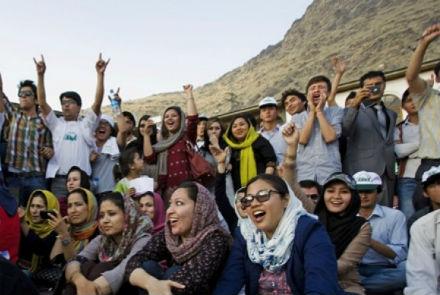Almost two weeks ago at least 14 people were killed in a horrific suicide bombing in the Afghan capital Kabul as they gathered to greet Vice President Gen. Abdul Rashid Dostum who was returning home after 13 months in Turkey.
More recently, a barrage of terror attacks rocked Nangarhar – Jalalabad in particular - portraying a country in turmoil.
Yet to view Afghanistan in this way is a mistake. These attacks aim to spread fear and violence. They also deafen many to the resilience of Afghanistan’s citizens and the many positive actions being taken by people spearheading progress.
Afghanistan is a country approaching a crossroads, driven in large part by the strong will of young people to live in a place where culture, creativity and perhaps, one-day, peace will prevail.
Afghanistan is a nation of young people. Over 60 percent of its population is under 25 years old. I am a part of this generation and grew up in the UK after fleeing the Taliban. Life under the Taliban’s rule was cruel and repressive. The group’s ignorant ideology meant that simple things like music, sport and education were severely restricted.
However, things have changed since the Taliban’s removal from power, and there is now greater access to education than ever before. Every day, boys and girls have the opportunity go to school and learn in a way that previous generations didn’t have. And along with that, they also have the chance to partake in extra-curricular activities such as traditional folk choirs and after school sports. The outcome has been an empowered generation of young people who are looking to rebuild their country, not by taking up guns to fight, but through exercising their civil and human rights.
Just last month, a Peace Convoy walked 700km over 40 days in the height of summer across the country to Kabul. The group of approximately 70 young men initially launched a sit in protest in late March demanding an end to the war after a suicide bombing killed 16 and injured 55 near a sports stadium in Lashkargah in Helmand Province.
The will of Afghanistan’s young citizens to pursue a life of culture and creativity was highlighted when the prestigious Polar Music prize was this year awarded to the Afghanistan National Institute of Music. Afghanistan’s pop sensation, Aryana Sayeed, performed at the prize-giving ceremony to an international audience and showed just how life in Afghanistan is more than just violence.
June saw jubilation across the country when Afghanistan’s Cricket team played their first Test match against India. It was a proud step forward for the country, being granted Test status by the International Cricket Council – the 12th country in the sport’s 150-year history to compete at that level. Moreover, the team achieved this status having overcome the obstacles of terrorism, displacement and war.
Although it faced much criticism, the temporary ceasefire that took place between the Taliban and government forces during the festival of Eid in June, was a fleeting snapshot of what peace could look and feel like in Afghanistan. During the three-day truce, young men from opposing sides met and captured selfies with one another. It was an indication of how peace, even if a long way off, could someday materialize.
Perhaps quiet to the ears of many, these examples provide signs that progress is being made. While such small victories of freedom may not be as loud as pictures of destruction, for many of Afghanistan’s youth, their importance is greater and their impact deeper.
As terrorists launch further attacks to disrupt and derail any such progress, we must celebrate those whose quiet resolve can be lost amid the noise of violence. And in doing so, support Afghanistan’s young citizens in their efforts to steer the country towards a progressive future.
Rabia Nasimi is 24 years old. She works for the Afghanistan Central Asian Association (ACAA) an organization that works to integrate refugees into British society. Rabia settled in the UK as a refugee, after fleeing the Taliban in Afghanistan with her family. She is currently a PhD candidate in Sociology at the University of Cambridge.

